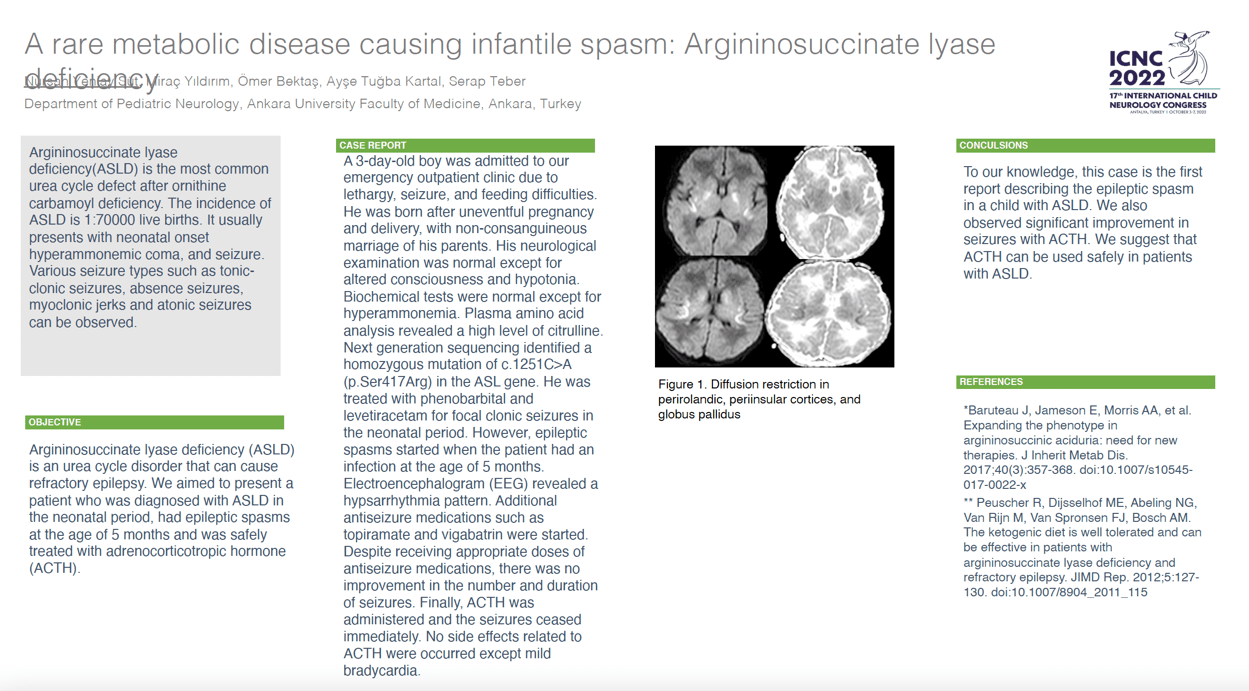A rare metabolic disease causing infantile spasm: Argininosuccinate lyase deficiency
Nurşah Yeniay Süt, Miraç Yıldırım, Ömer Bektaş, Ayşe Tuğba Kartal, Serap Teber
Objective: Argininosuccinate lyase deficiency (ASLD) is an urea cycle disorder that can cause refractory epilepsy. We aimed to present a patient who was diagnosed with ASLD in the neonatal period, had epileptic spasms at the age of 5 months, and was safely treated with adrenocorticotropic hormone (ACTH). Case Report: A 3-day-old boy was admitted to our emergency outpatient clinic due to lethargy, seizure, and feeding difficulties. He was born after uneventful pregnancy and delivery, with non-consanguineous marriage of his parents. His neurological examination was normal except for altered consciousness and hypotonia. Biochemical tests were normal except for hyperammonemia. Plasma amino acid analysis revealed a high level of citrulline. Next generation sequencing identified a homozygous mutation of c.1251C>A (p.Ser417Arg) in the ASL gene. He was treated with phenobarbital and levetiracetam for focal clonic seizures in the neonatal period. However, epileptic spasms started when the patient had an infection at the age of 5 months. Electroencephalogram (EEG) revealed hypsarrhythmia pattern. Additional antiseizure medications such as topiramate and vigabatrin were started. Despite receiving appropriate doses of antiseizure medications, there was no improvement in the number and duration of seizures. Finally, ACTH was administered and the seizures ceased immediately. No side effects related to ACTH were occurred except mild bradycardia. Conclusion: To our knowledge, this case is the first report describing the epileptic spasm in a child with ASLD. We also observed significant improvement in seizures with ACTH. We suggest that ACTH can be used safely in patients with ASLD.
Keywords: ASLD, metabolic disease, infantil spasm
Nurşah Yeniay Süt
Ankara University Faculty of Medicine
Turkey
Miraç Yıldırım
Ankara University Faculty of Medicine
Turkey
Ömer Bektaş
Ankara University Faculty of Medicine
Turkey
Ayşe Tuğba Kartal
Ankara University Faculty of Medicine
Turkey
Serap Teber
Ankara University Faculty of Medicine
Turkey
Objective: Argininosuccinate lyase deficiency (ASLD) is an urea cycle disorder that can cause refractory epilepsy. We aimed to present a patient who was diagnosed with ASLD in the neonatal period, had epileptic spasms at the age of 5 months, and was safely treated with adrenocorticotropic hormone (ACTH). Case Report: A 3-day-old boy was admitted to our emergency outpatient clinic due to lethargy, seizure, and feeding difficulties. He was born after uneventful pregnancy and delivery, with non-consanguineous marriage of his parents. His neurological examination was normal except for altered consciousness and hypotonia. Biochemical tests were normal except for hyperammonemia. Plasma amino acid analysis revealed a high level of citrulline. Next generation sequencing identified a homozygous mutation of c.1251C>A (p.Ser417Arg) in the ASL gene. He was treated with phenobarbital and levetiracetam for focal clonic seizures in the neonatal period. However, epileptic spasms started when the patient had an infection at the age of 5 months. Electroencephalogram (EEG) revealed hypsarrhythmia pattern. Additional antiseizure medications such as topiramate and vigabatrin were started. Despite receiving appropriate doses of antiseizure medications, there was no improvement in the number and duration of seizures. Finally, ACTH was administered and the seizures ceased immediately. No side effects related to ACTH were occurred except mild bradycardia. Conclusion: To our knowledge, this case is the first report describing the epileptic spasm in a child with ASLD. We also observed significant improvement in seizures with ACTH. We suggest that ACTH can be used safely in patients with ASLD.
Keywords: ASLD, metabolic disease, infantil spasm
Nurşah Yeniay Süt
Ankara University Faculty of Medicine
Turkey
Miraç Yıldırım
Ankara University Faculty of Medicine
Turkey
Ömer Bektaş
Ankara University Faculty of Medicine
Turkey
Ayşe Tuğba Kartal
Ankara University Faculty of Medicine
Turkey
Serap Teber
Ankara University Faculty of Medicine
Turkey

Nurşah Yeniay Süt
Ankara University Faculty of Medicine Turkey
Ankara University Faculty of Medicine Turkey